
Li Hui
“If it were possible to find a method of becoming master of everything which might happen to a certain number of men, to dispose of everything around them so as to produce on them the desired impression, to make certain of their actions, of their connections, and of all the circumstances of their lives, so that nothing could escape, nor could oppose the desired effect, it cannot be doubted that a method of this kind would be a very powerful and a very useful instrument which governments might apply to various objects of the utmost importance.”
Jeremy Bentham, Panopticon;1787-1791
“It is not when one has taken everything away that nothing is left, rather, nothing is left
when things are unceasingly shifted and addition itself no longer has any meaning.
Birth is residual if it is not symbolically revisited through initiation.
Death is residual if it is not resolved in mourning, in the collective celebration of
mourning.”
Baudrillard
If one looks at narrative today, there loom two questions, it seems to me. One is the role and nature of genre, the second is about crime. The third might be, is there even any narrative out there?
And perhaps there is a fourth question. And it is about the deteriorating ability and interest in actually reading complex narrative. The term complex is one in need of discussion, but more on that below.
I had a fascinating conversation with two friends the other day. The topic was the loss of curiosity in the most recent generations of the West. I’ve written about this of, but I see very few people under the age of 30, who read anymore. Not the way I think of reading. This has been a theme of this blog; the loss of pedagogical resistance to the Empire. For the resurgent fascism, and its acceptance by the U.S. populace is linked to the collapse of education, but specifically, to the collapse of a certain humanism. To art and culture. Education in the technical fields is excellent, but narrow, and increasingly even more hyper-specialized. The real casualty in this is curiosity. It is a generation without curiosity. My friend, a highly literate musician, graduate of a conservatory, says his children don’t know who Bach is, don’t recognize the name Stanley Kubrick or Velazquez or Jose Marti. But more, they don’t want to know about bonsai, or Chinese history, or Arab architecture and design, or about boat building, or medieval poetry, or colonial history.
I often get criticized for ‘meandering’. I wanted to clear that up. I like to ‘meander’. The instrumental logic that leads to specialization is constantly reiterated as effective, as cogent. In fact I dont believe it is. I believe there is plenty of that, anyway.
The script in place for Western media and Hollywood is stunningly racist, militarist, and Imperial. I watched an episode of Scandal, because I try to watch at least one episode of successful shows. In it a character appears who is described by another character as a “freedom hating crazy leftist dictator”. This freedom hater is from an unamed South American country. The character himself says (I paraphrase), “I know your government thinks I am something between Castro and the devil”. Such cliches, such propaganda is not even perceived as propaganda by the creators. It is their reactionary value system. And these are people who would describe themselves as liberal. Villains are routinely Russian, Arab, or Chinese. Almost daily one can see Russian villains with cartoon accents.
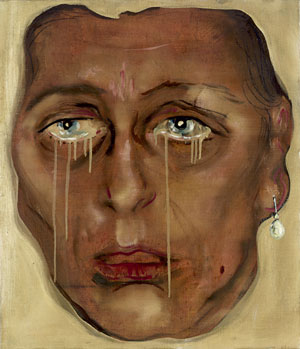
Jan Van Imschoot
Gilbert Mercier wrote this week…“In the US, real talent and hard work have little chance of success. The time of Ernest Hemingway and Jackson Pollock is long gone. Now all it takes to become rich and famous is a pretty face, a famous derriere, a busy sex life and a knack for publicity…This cultural race to the bottom is not only helped, but partly instigated by the major US media outlets.”
The U.S. supports the Gaza genocide. And the U.S. media in knee jerk fashion supports whatever the state department and Pentagon tell it to support. But genocide is an American tradition after all.
John Marciano wrote: ” L. Frank Baum, author of the much-beloved Wizard of Oz, then editor of the Aberdeen Saturday Pioneer, who stated: “The whites, by law of conquest, by civilization, are masters of the American continent, and the best safety of the frontier settlements will be secured by the total annihilation of the few remaining Indians…. [We] had better, in order to protect our civilization, follow it up … and wipe these untamed and untamable creatures from the face of the earth.”
Torture and violence were also visited upon Filipinos during the American imperial war in the early 20th century; Vietnamese, highlighted by the most-publicized atrocity of that war at My Lai in 1968, and the deaths of some 3.8 million people; Guatemalans, Nicaraguans, and Salvadorans, with hundreds of thousands killed in the 1970s and ‘80s; and at Bagram, Afghanistan; Abu Ghraib, Iraq; and Guantanamo Bay, Cuba. The list of crimes is endless.
It is perhaps worth reflecting on the nature of narrative as it exists in the culture industry today, and also how that interfaces with this erosion of curiosity.
I watched the first season of Halt and Catch Fire, the new AMC series centered around the origin story of Microsoft and the relationship to IBM. Texas in the 80s. Its a remarkably well photographed show, and features a killer sound track, but, mid way through a first season, a season that I thought highly of, in some ways, I realized I felt the narrative become more and more neurotic. There was no primal crime. And when there is no crime, there is a strong tendency to deteriorate into melodrama.
Now, the fact that the culture industry instinctively realized the importance of violence has meant that they would and could eroticize this violence, the death, and repeat it. In a sense the TV cop show and hyper violent military narratives have actually eliminated true narrative, and replaced it with violence porn, the constant unending repetition of murder and death. It effectively removes the primal crime from the other direction in a sense.
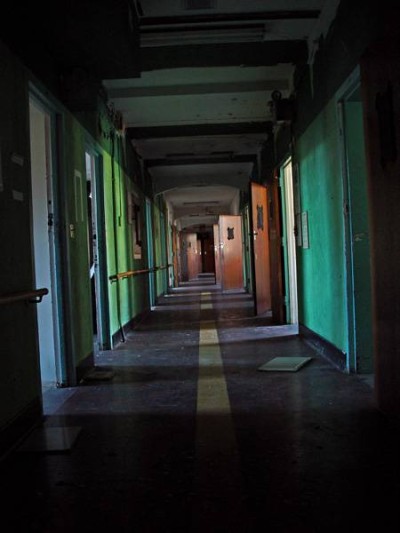
Malone Psychiatric Hospital, built 1927, location restricted. Abandoned. * photo by Opacity.us

Helen Pashgian. At LACMA.
Of course this is simplistic, but only because there are substitute tropes; there is power, and there is the sensory trauma of the inordinary. “The train smelled like the inside of an old man’s hat –smelled of darkness, hair, tobacco.” Blau quotes that line from John Hawkes. For there is, besides power, age and age is only a step away from death. But in our ever more sanitized society these things are inordinary. The more killing and plunder that occur in real life, the more carefully contained and controlled they are in media. Shakespeare and Marlowe, and Kyd, and Dostoyevsky and Tolstoy, and Hemingway and Eliot and Melville all wrote about murder and death and disease. For that is the negation of the untruth. Today there is a huge anti-Freudian tendency, and its reflective of these same sanitizing trend. Freud has perhaps never been more relevant. From Syria to Gaza, the narrative being written reflects the delusions of power, and of sadism. But MFA programs do not turn out Dostoyevskys or George Eliot or Juan Rulfo. There is no Jean Genet, there are ‘gay spokespeople’. It is what Sarah Shulman called the gentrification of the mind.
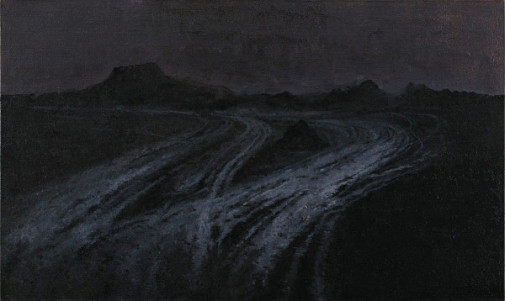
Pan Jian
Violence porn effectively removes the dignity of a single life, there can be no tragedy in a world of surplus populations available for extermination. But most of all, it removes the actual viewer as a person. The product is watching you, it is harvesting attention. If each artwork recreates the coming into being of the individual, the human, and stories of crime reflects our innate rivalry and aggression, the sense of lack suffered by the time we, as very young children, recognize our reflection in the glass or mirrors around us, then the reified story-code is only a mental mechanism, easily forgotten because it was never attentively watched or read to begin with, which serves as a sort of cultural Big Mac. These products are not functioning in at all the same way as one has come to assume. And the Lacanian focus on repetition is then given material proof in the undeviating sameness of today’s film and TV. The compulsive repetition of murder and mayhem means there is no viewer. There is only the consumer, the harvested eyeballs, and stimulation, blanketed manipulation. Its a bit like attaching electrodes to a dead frog and turning on the current. There are only electrified frogs, not people, snatching flies out of the air. This the primary truth of hyper violence in cultural kitsch. But more, of course, is that a degree of titillation is imposed — and transferred, often. Meaning, the wet T shirt contest scene at the bar, with brave young soldiers having a bit of fun, is followed by the sound of an alarm…or phone call…EMERGENCY….the ‘threat’ is arriving, from ‘out there’ and those soldiers must respond…and kill. The camera then follows the same eroticized caressing of the breasts in wet t shirts to the wet gun in wet hand (metaphorically speaking, the wet part), to the spreading wetness of blood on the various corpses. The caressing camera. There are of course a hundred such examples. Young couple in bed, the killer arrives and slashes the woman (of course, because patriarchy is always preserved) and next scene are two cops examining the dead girl, often naked dead girl, with casual disinterested touching of what is now just meat, but the scene still retains the echoes of the lover’s caresses — now replicated by police as part of the legacy of violence; the erotic caress is replicated as the blow from a policeman’s baton.
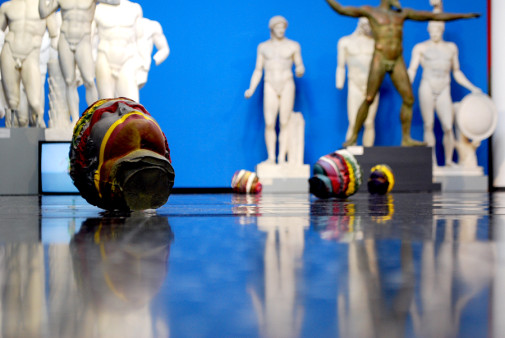
Oliver Laric, “Kopienkritic”, at Skulpturhalle Basel
It is the camera creating the narrative linkage here, without recourse to having to actually have a narrative. The camera connects the young lovers naked sex activity, with the naked corpse now being fondled by a forensics team. This product operates the way advertisements operate. It is interesting that there are now so many close up graphic scenes of either operations or forensic autopsies. These, I suspect, express a desire for what is hidden, that is kept from us. The viewer is the corpse, or terminally ill patient, and we sense there is a hidden cancer in us. One could extend this speculation to see the body-politic being dissected for the tumor or malignancy within. The ruling class is operating on us. It is they who see, or surmise something that needs surgical intervention. As such things are always overdetermined, the body on the table is the sick world where only the ruthless surgical scalpel, wielded without hesitation, can clean out the sickness. Even military grammar reflects this; surgical strikes. Either way, the operation is what matters, not the outcome for the patient.
I am reminded of a brilliant short scene in David Hare’s film Weatherby (1985). After a young man commits suicide in a woman’s home, the police arrive. And in searching for a motive, a young uniformed policewoman re-enacts the last minutes of the dead man’s life. She walks dispassionately and blankly through the motions. Its a gorgeous scene, and resonant with multiple meanings. But one of the meanings is to comment on the gaze of the viewer, and its duplication in the gaze cast upon the uniformed policewoman by the other characters.
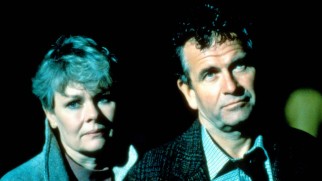
Weatherby (1985) David Hare, dr.
The couple in bed, making love is quickly the disinterested and jaded police and forensics team probing the naked corpse. It hardly matters if its really naked, anyway. Because the camera is voyeuristic, and undresses it. If one compares this to the treatment of both crime and nudity with Stranger At the Lake (2013, Alain Guiraudie), where the crime is helping define the narrative. Rather than the narrative allowing the viewer to consumer the crime as it might read a porn magazine. The crime is an expression of an entire sub-cultural frame, and hence is connected at an interpretive level with the history and politics of gay men in France, of vacationing, of salaried workers taking summer off, and of desire. This is a basic truth of film-making I think. The camera must always be aware of what is out frame, as well as what happened in the past. What is impossible to photograph. The famous shot of Rita Hayworth, stretched out on the deck of the sailing vessel in
Lady From Shanghai. It is Welles’ homage to Hayworth’s beauty, but it’s not voyeuristic. Why? The first answer is because the camera is not a secret peeping Tom, and the scene is about what else is going on. The truth is of the scene is that you cannot take your eyes off Rita Hayworth. You should, there is much to see, but you cannot. Even a god could not. There is nothing titillating about it, though. The character Hayworth portrays is fully aware of God looking down upon her. One could take any of Pasolini’s films, or say, Bruno Dumont in L’Humanite, where the perspective of the camera is very important, for its a part of the policeman’s anxiety, his confusion, his obsession. The camera is reproducing a character’s moral panic.

Matthias Weischer
The camera is, finally, the arbiter of narrative in cinema. Everything follows the camera. In Dreyer’s Ordet, the repression and rigidity of the characters is enhanced and expressed in the restrictive camera. In each exterior scene the camera pursues, something, much as the characters pursue — and when inside the architecture replaces the camera. The sexual restrictions become architectural restrictions. In Fassbinder’s Chinese Roulette, the camera’s sensual exaggeration mocks the emotional minimalism of the characters. Everything they want to feel, but cannot, is found in the dreams of the camera. But the camera is not caressing, it is excavating the performances, as it excavates class tensions, and sexual tensions. In this, the murder takes place at the end. All things move toward the inevitable. Except the audience never knows for whom that second shot is intended. For Fassbinder, it is enough that there IS a murder (or two). It is there in the room, and throughout, from the beginning.
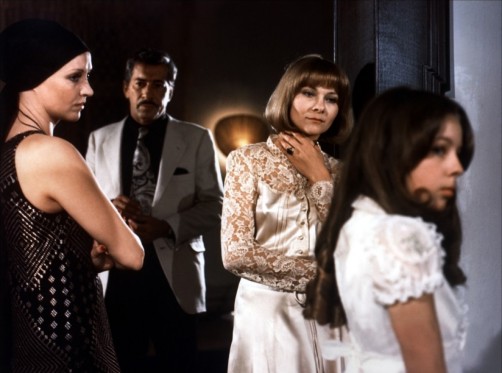
Chinese Roulette (1976) Rainer Werner Fassbinder dr.
The construction of studio film today is based on alibis. Denounce racism, as a way to express racism. Ideas of adjustment and normalcy are promoted. Im just an ordinary average guy, is a way of exceptionalizing the average, and turning it into its opposite. Boyhood, as Armond White rightly points out, ultimately confers importance on the central character’s normalcy. The camera is pseudo documentarian, meaning it tacitly imitates the conventions of verite. Normalcy is a movie, a familiar movie. Its like false modesty. But such films are so utterly without intelligence, that their popularity should not be a surprise. The white privilege of the family Linklater gives us is never questioned. Why question what is normal? Again, however, this takes me back to the idea of crime. Because at this point the genre conventions of mystery and detective narratives, even police procedurals, have superseded other readings. In other words, one almost has to read these films firstly through the filter of genre. Crime is the return of the repressed, in narrative anyway. And the more writers and film-makers try to distance themselves from genre, the more insufferable their work becomes. But that is a tricky idea because in a sense everything is now a genre. And especially a crime story. In the excellent Mister John, there is no clear crime. It is a crime movie without a crime. Or we think there is no crime. But the narrative is constructed as if it were a detective story. The businessman arriving in Singapore is not a Knight Errant, not a man with a code — but the camera treats the story as if it were a murder mystery. There is no crime but we suffer as guilty anyway. But this is movie that actually IS about death, about mortality. Crime show murder and killing is never about death, its about the killing. But its about the killing as if killing were a sporting event. In Mister John, the brother’s death is not normal, because death is never normal. Everyone dies, but each death is exceptional. In Moby Dick, the killing of whales is the projected violence of the entire society.
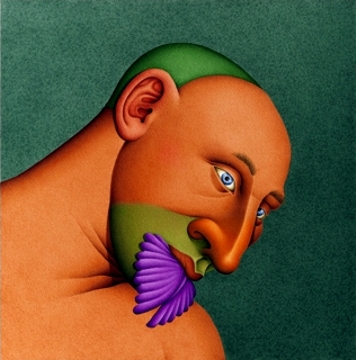
Robert Lostutter
“In particular, our sentimentality toward animals is a sure sign of the disdain in which we
hold them. It is proportional to this disdain. It is in proportion to being relegated to
irresponsibility, to the inhuman, that the animal becomes worthy of the human ritual of
affection and protection, just as the child does in direct proportion to being relegated to a
status of innocence and childishness. Sentimentality is nothing but the infinitely degraded
form of bestiality, the racist commiseration, in which we ridiculously cloak animals to the
point of rendering them sentimental themselves.”
Baudrillard
There is now, in Hollywood narrative, the never ending small adjustments or corrections that serve as an alibi for the great untruth of the product. This or that problem or mystery is solved, thereby reinforcing the backdrop against which this all takes place. The presentation of solving something prevents the narrative continuation, and hence the status quo remains something like a state of nature. Once the solution is presented, these films have nothing left to tell.

Nicole Phungrasamee Fein
The false transparent now infuses discourse. Obama is transparent. This is uttered even as more and more is kept secret. The transparent means only the ungrounded. You cannot know transparent if you do not know real density. The truly opaque screen no longer hides, it de facto questions. The glass window reveals nothing, for there is nothing to see, much like airports where one can look out the large windows and see nothing of what is actually going on. You dont see your own plane. We dont see or know where the electricity lines run beneath our streets, or the water pipes. Its a secret. Politically, one can read and see a good deal of what isn’t going on.
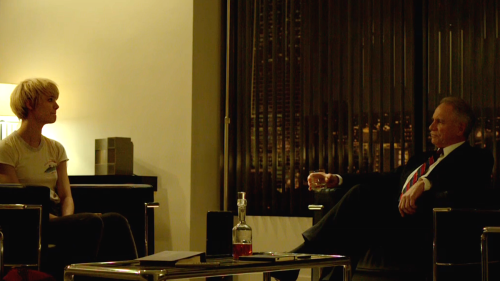
“Halt and Catch Fire”. AMC TV 2014
But let me return to the idea of narrative and melodrama for a moment. And to space. For the space of the new Hollywood melodrama is one defined by previous movies. Hollywood executives do not experience the real world. The exploration of the world does not take place, largely, by those making movies today. The world is only made of references from other earlier movies. The p.o.v. of studio film and TV is that of someone staying at 5 star hotel.
The greatest virtue of Halt and Catch Fire is the consistently strange amber and gold tones of the night scenes. Everything looks like a Rut Blees Luxumberg photo essay. But more, it provides the gnostic patina needed as a corrective to the corrosive banality of computer manufacture. Try as the show might, the revelation of a talking Mac falls far short of real revelation. What keeps our attention is the perversity of Joe MacMillan (Lee Pace) and his pathological lying. Writing code is not dramatic. It is unsettling however.
Genre is the recognition of structural similarities, and conventions of location and style. One knows it’s a western because one has seen other westerns. It is a culture of inexhaustible sampling. Cutting across this is the inability for mimesis. Adorno’s ideas on mimesis borrow from both Freud, and Nietzsche, but also from Kierkegaard. He saw it as a mode of human conduct (Zuidervaart). Putting aside the originary mimetic impulse, the later process preserved Art, or vice versa. Art, and mimesis, dialectically give voice to the real objectivity of the world. But this only happens through a series of stages of negation. What Adorno called ‘expression’ and the language of nature, of the world, is, as he says, mute without artistic acts. Art seeks the appearance of the whole in the particular (Zuidervaart again). This is what is so lacking in modern film. Expression is treated as magic. As an irrational personal subjectivity. It is divorced from historical suffering, and from the material world. It creates only a semblance of ‘a’ world.
“Truth content always points beyond the immanent aesthetic make-up of art works towards some political significance.”
Adorno

Jeff Brouws, photography.
The import of artworks is a sort of social function, not a political impact. It is never the message that matters, but the interpretation and the interpretive process of the artwork; and this interpretation is linked to both mimesis and autonomy. Without going too deeply into this (since I’ve done so several times on this blog) the point here is that the rational is now the irrational. Instrumental thinking leads one toward the sentimental and trivial. For Adorno, the crucial element in aesthetics was to develop a sensitivity to art, that only via deep philosophical engagement can one find an adequate base from which to both experience and create art. This sort of discussion is, today, sneered at. So bad is most art instruction that students reject the complex and turn to the empty new populism of consumer culture. Artworks are negations of the untruth of an irrational society. But this negation is, in the artwork, is not a simple matter. I’ve heard students say they are sick of Shakespeare. This is almost certainly the result of poor instructors. Art is an expression of suffering, both immediate and historical, and always a rejection of the status quo. There can be no decent art that reconciles with a system of domination.
It is better to accept emptiness that to seek out optimism. Of course the self consciously nihilistic is only another form of optimism. That is the alibi, again. When there is no story, it is almost always replaced with fake optimism or hope. The idea of artistic hope is the real nihilism. A film about emptiness (of any sort) almost always is really about ‘hope’ springing from such emptiness. The logic imposed reads ‘why make anything, create anything, if there is no hope?’ The answer is, that is why you do. In Hollywood, such an existential stance is always rejected, for without a branded hope, the studio is not helping create a good consumer.
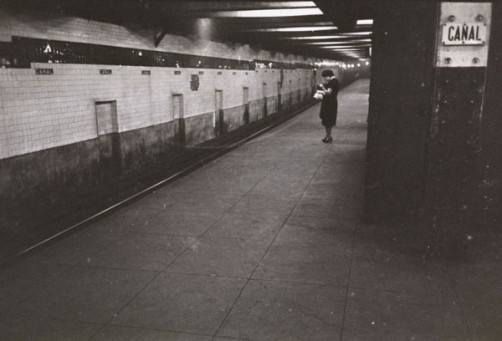
Stanley Kubrick, photography. 1951
At the end of Middleton’s The Changeling, Beatrice says to her father:
“O come not neer me sir, I shall defile you,
I am that of your blood was taken from you
For your better health, look no more upon’t,
But cast it to the ground regardlessly,
Let the common shewer take it from distinction,
Beneath the starres, upon yon Meteor
Ever hang my fate, ‘mongst things corruptible,
I ne’re could pluck ti from him, my loathing
Was Prophet to the rest, but ne’re believ’d
Mine honour fell with him, and now my life.”
This is language very much too dense, too knotted with pain and expansive feeling for much of today’s audience.

Adam Lach, photography. Swiebodzin, Poland. World’s largest statue of Christ.
A footnote of sorts to my last posting. It is important to understand that the driving force of western Imperialism was facilitated by PR, by marketing. Theirry Mayson wrote: “Theodor Herzl was an admirer of diamond magnate Cecil Rhodes, British imperialism theorist and founder of South Africa, Rhodesia (to which he gave his name) and Zambia (formerly Northern Rhodesia). Herzl was not a religious Jew and had not circumcised his son. Atheist like many European bourgeois of his time, he advocated first to assimilate the Jews by converting them to Christianity. However, taking up the theory of Benjamin Disraeli, he came to the conclusion that the best solution was to engage them in British colonialism by creating a Jewish state in present day Uganda or Argentina. He followed the example of Rhodes in buying land and building the Jewish Agency.
Blackstone managed to convince Herzl to join the concerns of dispentionnalistes to those of colonialists. For this it sufficed to consider establishing Israel in Palestine and multiplying biblical references. Thanks to this simple idea, they recruited the majority of European Jews to their project. Today Herzl is buried in Israel (on Mount Herzl) and in his coffin the State has placed the annotated Bible that Blackstone had given him.
Zionism has thus never had the goal of “saving the Jewish people by giving them a home,” but the triumph of Anglo-Saxon imperialism by associating them with it. Furthermore, not only is Zionism not a product of Jewish culture, but the majority of Zionists has never been Jews, while the majority of Jewish Zionists are not religious Jews. Biblical references ubiquitous in Israeli public discourse, reflect only the thought of the believing part of the country and are primarily intended to convince the U.S. population.” The ideas of racial segregation and eugenics was a primary driving force for the early Israeli state, and the connections to South Africa are hardly accidental. But the US has reached a point where this is not seen as particularly bad. That the Israeli settlers resemble American settlers on Native American land, is often mentioned by Israelis themselves. This is the new conservative history, and the result of people like Niall Ferguson and Samuel Huntington before him. Anyone wanting to discount Freud, need only examine the current Israeli state and remember National Socialism. Or look at Gaza and remember the Warsaw Ghetto.
“It is absolutely wrong to think that the problem posed by Israel concerns only the Middle East. Today, Israel takes militarily action anywhere in the world poviding a cover for Anglo-Saxon imperialism. In Latin America, Israeli agents organized repression during the coup against Hugo Chavez (2002) or the overthrow of Manuel Zelaya (2009). In Africa, they were everywhere present during the war of the Great Lakes and organized the arrest of Muammar el-Qaddafi. In Asia, they led the assault and killing of Tamil Tigers (2009), etc.. Each time, London and Washington swear they are not involved.” Thierry Mayson

L’Humanite (1999) Bruno Dumont, dr.
Eighty four year old Fidel Castro said this week, that the holocaust in Gaza marked the emergence of repugnant new fascism. It is the first fascist movement to develop with the full assistance of the marketing. Its branded fascism. The Israeli state has, for decades, controlled the narrative about its own creation. That control is slipping away. Perhaps this is the irony of an audience that cannot read narrative.
George Steiner once said: “Use a language to conceive, organize, and justify Belsen; use it to make out specifications for gas ovens; use it to dehumanize man during twelve years of calculated bestiality. Something will happen to it. . . Something will happen to the words. Something of the lies and sadism will settle in the marrow of the language.” And today, one bounces between the open racism and belligerence of Netanyahu (and various other Likud psychopaths) and the tight lipped sadism of Obama (and troll like minions such as Nurland, Power, Rice, and Biden). Paul Street quoted Macbeth for his short piece on Obama — “Thy bones are marrowless, thy blood is cold.” (Macbeth, 3.4.93) For all these are spiritually hollow men.
Phil Greaves writes: “The historical record of Western-GCC-backed insurgencies in the Arab and Muslim world provides copious amounts of evidence to show that invariably the United States and its Saudi partners have always utilised, fomented, and sponsored reactionary forces to meet geopolitical ends, particularly when subverting or attacking nationalist governments that refuse to abide by the Anglo-American capitalist order – with disastrous consequences for the countries in which the fundamentalist proxies are set upon.”
The master narrative has not slipped as far in U.S., but it is slipping some. For a variety of reasons I thought of John Water’s comment about Wizard of Oz (speaking of L. Frank Baum) saying he wanted to make the sequel, where Dorothy returns from Oz and keeps talking about it, so they put her in a mental institution and give her shock treatment.
In Chinese Roulette, the cook’s son Gabriel, asks the gas station attendant, in a quiet voice; “Have you ever been in hell?” The attendant simply answers “Yes”.
We are at that place collectively. There is nothing to parody. There is only insanity left. As Artaud said, madness or slavery. In this week police shot yet ANOTHER unarmed young black man, this time in Ferguson Missouri (St Louis), dead fish are showing up in record numbers along the north Pacific coasts, there are massacres being carried out in three places all of which use U.S. made weaponry, and all are occuring because of the United States foreign policy. The permafrost is melting in Siberia and creating giant inexplicable holes some thirty meters across. They call them ‘Dragon’s Mouths’. Ebola is the new branded fear, and even its name is racist. Why not just call it Bongo Bongo from the Congo. It is the medical version of the black teenager in a hoodie.
“I stroll along serenely, with my eyes, my shoes, my rage, forgetting everything,
I walk by, going through office buildings and orthopedic
shops,
and courtyards with washing hanging from the line:
underwear, towels and shirts from which slow
dirty tears are falling.”
Neruda (Bly translation)
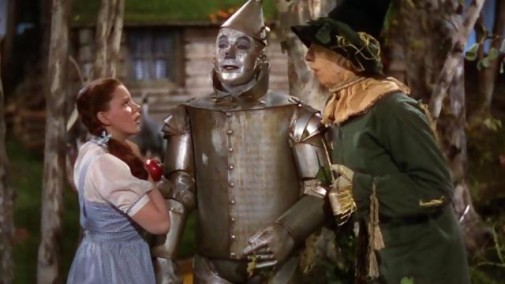
The Wizard of Oz, 1939. MGM.

Among the books I’m re-reading this summer are my favorites from Ondaatje and WG Sebald, among the few recent writers who’ve created new worlds, IMHO.
I love the quote from Ondaatje,
“The first sentence of every novel should be: Trust me, this will take time, but there is order here, very faint, very human. Meander if you want to get to town.”
Can you imagine a mini-series based on Sebald’s walks and historical meanderings? That would get me back to watching tele.
I don’t know if its kosher to put in person triflings in this space, but reading this post made me think about some things I’ve experienced this summer.
I have come back to living in the Pacific NW this year and have encountered instrumental logic again full force, everything is just algorithm. And overheard incredibly racist comments, slave owner mentality at events and coffee shops.
Something that has really stunned me is that there is no conviviality in cafes here. And it’s frowned upon if you are having too much fun. I was having great wide ranging conversation with a friend and we were laughing a bit loudly and this woman who was sitting alone doing “important work” on her laptop actually told us to quiet down… Our conversation was distracting her. This was in a large Starbucks… I had just been in Rome a couple months back and I tried to imagine someone there scolding strangers in a cafe because they were enjoying a fun conversation together. Wow.
I was recently finalist for a what would be termed a good job but I realized that the people around the table at my last interview just wanted to hear tripe and be comforted that I would be orderly and use jargon and create sound “metrics”. Since I couldn’t stand these people and didn’t want to work with them in any case, I used my time in the interview to try out deeper philosophical ideas about what the work was really about and that what I liked about the field from my previous experiences were the psychological aspects, complexity,creativity (I’ve been successful, demonstrably, whatever audited metrics you want to choose…) and I completely lost these people, including one woman who looked at me with disdain. I knew what they wanted to hear, but I’ve just reached a point where authenticity seems more essential than short term gain. How naive can a person be?
Thank you for the Neruda/Bly at the end — the joy with which he recites those lines could/should break even hard hearts out of complacency.. I’m eternally grateful I was able to see/hear/meet a mad man like Bly early on in my life. Otherwise I may have become a drone…
”
Something that has really stunned me is that there is no conviviality in cafes here.”
You noticed ? Living in the Pacific NW for several years now and an cronic coffee
shop dweller. I notice the coldness all the time. You will get less of this if you avoid
places like the Kmart of coffee shops (Starbucks) but it is there all the same.
If I may rant slightly here….. Your comment “The topic was the loss of curiosity in the most recent generations of the West” shows suprise. This is BY DESIGN….our
“public education” works hard to make sure any spark of curiousity is quickly
and efficiently stamped out. The state simply cannot have its future serfs (er…
citizens) thinking for themselves. You think a jest…read the steady stream of
kids drug off in hand-cuffs for the most frivilous reasons and ask me how much
curiousity you would have after watching your more adventurous classmates
tazered, humiliated and drug off in cuffs….I’d stay as far away fom interest in
ANYTHING after that.
@SINN roger………….boy, yes, of course its by design. Couldnt agree more. And the stamping out starts ever earlier. I see it in first grade……the restrictive advice about anything creative. Everything is labeled deviant almost.
As for coffee shops…….its a pet peeve of mine. I will say that when I lived up near joshua tree in the high desert in calif, there was a great starbucks i went to everyday. It was all this weird bikers for Jesus, and assorted meth cooks, and survivalists………but very enjoyable, and chatty. Crazy conversations, but surprisingly ‘convivial’. But in general what you say is true. Part of it is that people have largely forgotten how to have conversations, how to talk. They dont tell stories, and fear to share opinions.
As for Bly……he was a shining light in the sixties. And he remains a remarkable man. Always refused University teaching jobs. Never took one.
“The logic imposed reads ‘why make anything, create anything, if there is no hope?’ The answer is, that is why you do.”
Thanks for saying that. “Hope” is a very irritating word to me.
If I can offer any sort of consolation (not hope though, because I am a rather hard and despairing person)–I am under thirty and have read and do read a fair bit of literature BECAUSE I WANT/NEED to, NOT because it is for school, or for my job or something. When I was still in high school I read George Elliot’s Middlemarch one summer because I wanted to, because I was interested in that world, in that language… Did I understand all of the historical and political implications of that novel? Certainly not. But I think literature operates on us (or perhaps the word is “through” us), in subtle ways…
Just yesterday I had a conversation (yes a real conversation including stories and opinions) with a dear friend and mentor of mine who teaches anthropology and ethnographic theory at the university level. She was bemoaning the state of students today–mostly undergrads, but more and more graduates too–that they don’t have curiosity, that they don’t ask interesting questions, that they need their hands held through learning and want to be told the rules and the answers so that they can memorize and follow them. I see it too. I suppose if there were such a thing as “hope,” for me, it would look like curiosity–which means living in doubt, in uncertainty.
At a recent seminar I attended, instructed by two previous students of Grotowski, one of the instructors told us that she remembers Grotowski saying to the American actors that one of the problems with American actors is that “they don’t know what it is like to suffer.” I think this statement says a lot and could be analyzed from several angles. It reminds me of many things you write on this blog. I’m thinking, for instance about what you say about tv/film focusing on “killing” rather than “death.” I’m also not sure if it is true that ‘Americans don’t know what it is like to suffer’ per se, but that many deny their suffering, or cannot admit that their suffering is complicated by the kind of existential grief and anguish that come from confronting a historical, social/political reality of violence (colonial, racial, etc.). There seems to be little self-reflection.
@calla……..Glad you said that about reading Eliot (who seems to be coming up a lot recently)….because its absolutely true. One can read very difficult material…even philosophy, and feel as if nothing is being retained, nothing is really being understood. But it almost always is….it operates on you…great word Ive used myself. It operates in often very deep and peculiar ways, and it resurfaces later….sometimes years later. I was only about 17 when I first read Wittgenstein. The blue and brown books. And i thought, fuck, I dont have a clue what he’s going on about. But i finished it. That book stayed with me, in unconscious ways, it was buried but operative. And thats how it is with most books I think. The duration it takes to read….its very different from watching film, or even theatre. Although Ive often told the story of the first time i saw waiting for godot. I was about 13. I was riveted. It was like a secret history of something. But with books, the time one has to invest is very significant i think. I had a job once, as a security guard…i was maybe 24, and i had the graveyard shift at a medical center. Only me. Literally nobody was in the building. A six story building. I made the rounds once every other hour with those strange little clocks you had to carry and youd have to punch with a key at various locations in the building. Well, 12 to 8 am…….and all i did was read. I read Ulysses over a six month period. For some reason it was the perfect way to read that book. Perfect. And ive not ever forgotten the feeling. That building, the emptiness, the quiet, the spookiness. And it was very spooky actually. So, I think the loss of reading is something quite important. And no amount of apology for paradigm shifts and techo literacy and visual literacy really changes the fact that something humanizing takes place within the relationship to books.
I think what you say here about art and literature “operating” on us imperceptibly is very true and important. I was a security guard as well, working at an art museum for sixteen years and covering both night and day shifts. I spent what time I could reading Spinoza, Descartes, Kant, Melville, and many others I have now forgotten. And it was spooky, a feeling enhanced by the fact that the museum I worked for was a small art collection housed in a mansion built in 1820 (Taft Museum, Cincinnati). I later went on to college and graduate school, and currently teach philosophy at a small Catholic college– but my years watching over the museum in the early hours of the morning were somehow far more significant than any of my formal schooling.
@jerome…i have to comment briefly. Its a wonderful sort of environment …..that being so solitary and alone. I only worked at that clinic for about a year and a half. But its indelible still, those hours spent reading in the absolute silence. I can remember it very vividly. The sound of my steps in the corridors, the odd sounds the building made, and just the quality of the air even.
“The sound of my steps in the corridors, the odd sounds the building made, and just the quality of the air even.”
If literature can “operate” on us, I think buildings can too. If we learn how to listen…
I don’t know if it is about being “solitary and alone” though that might be part of it. What I like about empty or sparsely populated public spaces is the presence of traces from people, and ideas, and stories, and relations… So much suggested but not conclusive. Every scuff on the floor and paint chip off the wall is a trace of a story that may unravel for you, or simply wink at you in the dark as you pass by.